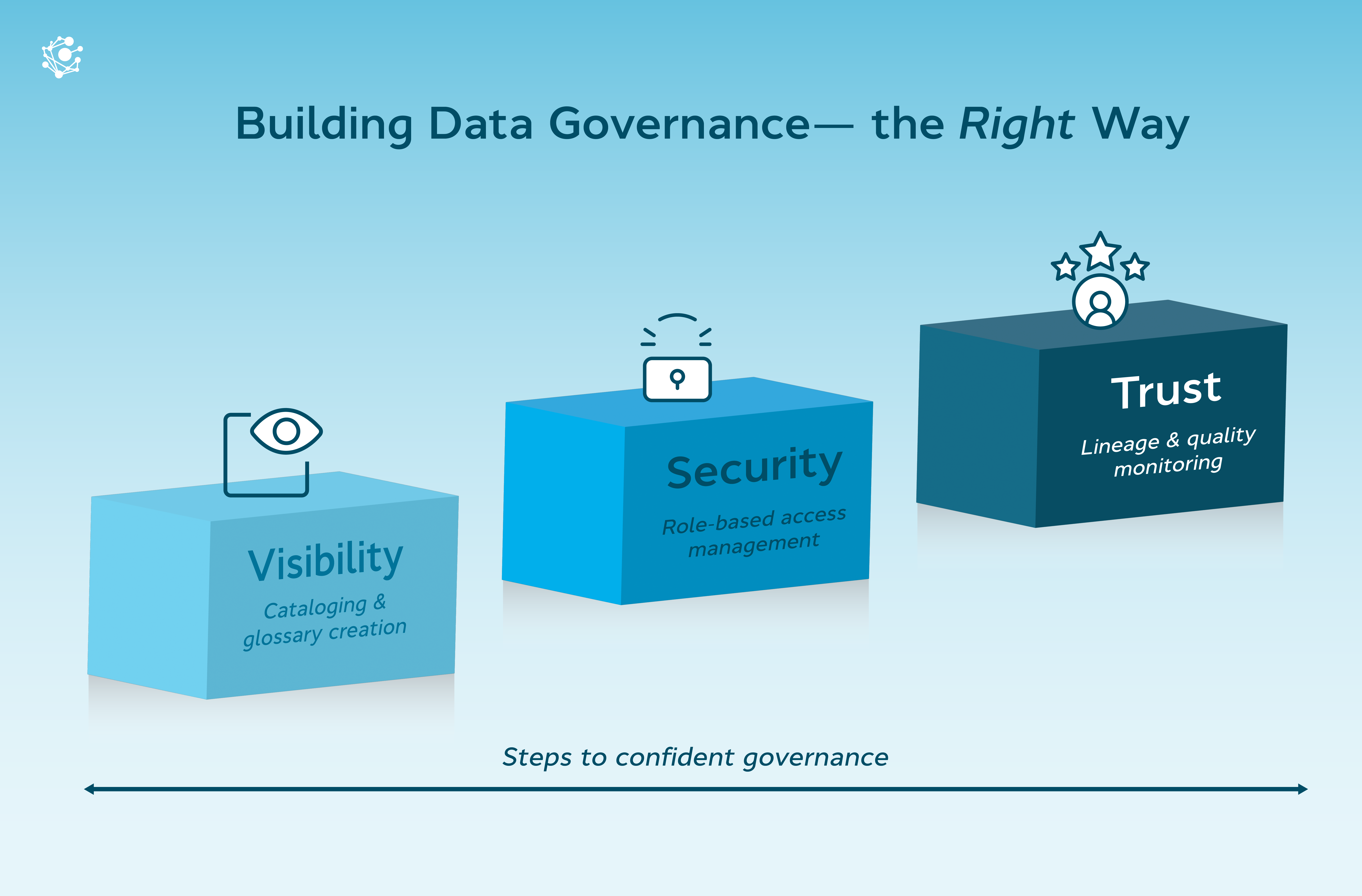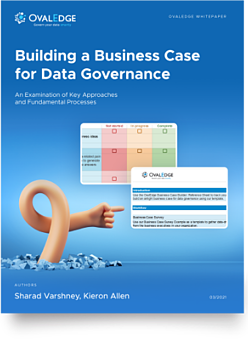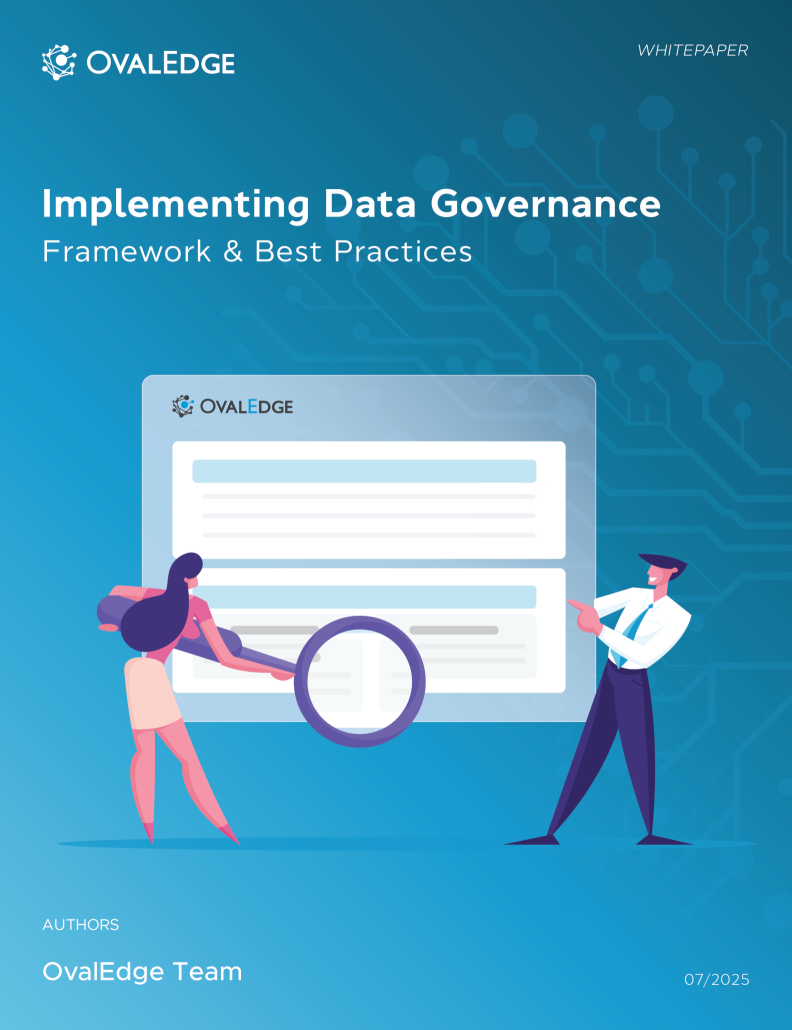Table of Contents

Modernizing Data Platforms with Governance First
Modern data platforms like Microsoft Fabric and Databricks promise speed, but without governance they only accelerate chaos. Governance is not just for compliance, it’s the foundation for trusted self-service analytics and AI adoption. By starting small with cataloging and scaling into lineage, quality, and access, enterprises can modernize with confidence. OvalEdge makes this journey practical by automating governance, integrating with Microsoft and Databricks ecosystems, and delivering durable business value.
Speed without control: The hidden cost of modern data platforms
Organizations are moving fast into modern data platforms like Microsoft Fabric and Databricks. These technologies provide agility, scalability, and the ability to process more data than ever before. But speed without governance leads to faster chaos: reports that don’t match, dashboards that contradict, and AI models that fail because they’re fed with poor-quality or misunderstood data.
This problem isn’t limited to highly regulated industries. In fact, most enterprises outside of finance aren’t motivated primarily by compliance. They want to empower their business users with self-service analytics and to prepare their platforms for AI adoption. Governance is what ensures both are possible, it creates the trust needed for people to actually use the data.
For example, many mid-sized enterprises with 2,000–5,000 employees are heavily invested in Microsoft ecosystems like Fabric and Databricks. They start by centralizing data in lakehouses or warehouses, but soon realize their teams can’t trace reports back to sources or trust dashboard numbers. At this point, governance becomes essential for adoption and scale.
From chaos to confidence: Building data governance the right way
The good news is that governance doesn’t have to be overwhelming. It’s a land-and-expand journey where organizations can start small and scale gradually.
-
Step 1: Visibility through cataloging and glossary
A catalog answers foundational questions: what data exists, where it lives, who owns it. Pairing it with a glossary aligns business and IT, ensuring metrics like “Active Customer” or “Gross Margin” mean the same thing across departments. -
Step 2: Security through access management
Through the catalog, you only have access to metadata. As adoption grows, role-based access and classification become crucial. Sensitive fields can be masked, business units segmented, and policies enforced consistently without slowing down day-to-day work. This way, everyone has access to data and can use it for self-service analytics. -
Step 3: Trust through lineage and quality
Lineage creates transparency by mapping reports back to sources, so teams can quickly trace errors or confirm data integrity. Quality rules and monitoring ensure critical datasets are fresh, complete, and accurate.
In practice, smaller customers often begin with just a catalog and glossary to show immediate value. As adoption grows, they expand into lineage and access. Many expect lineage to be included from the start, as it’s critical for trust. Pricing sensitivity also shapes this journey, smaller customers look for pragmatic starts around the 30K range, while larger ones can scale up to 100K projects.
This incremental approach avoids the trap of over-investing early in governance capabilities that the business isn’t ready to adopt. Instead, it ensures value at every step and makes governance an accelerator, not a hurdle.
Making governance practical with OvalEdge
While governance principles are platform-independent, execution depends on the ability to connect across environments. This is where OvalEdge makes governance practical.
-
Seamless integration with Microsoft and Databricks ecosystems
OvalEdge connects natively with most technologies like Microsoft Fabric, Databricks, SQL Server, and SAP, consolidating metadata into a unified catalog. This allows enterprises to apply one governance strategy consistently across warehouses, lakehouses, and BI platforms. -
Automation at the pace of data growth
OvalEdge automates the discovery, classification, lineage mapping, and sensitivity tagging. As new datasets are ingested into MS Fabric or Databricks, they are automatically cataloged and governed, ensuring governance keeps pace with the platform. -
Business-friendly adoption
Governance isn’t just for IT. OvalEdge’s catalog and glossary are designed for business users with intuitive search and natural language capabilities. Business teams can find datasets, understand definitions, and explore sample data without bypassing governance. -
Quality and trust built in
Scorecards, anomaly detection, and prioritized rules keep quality visible. When an issue arises, lineage shows exactly where it started and who owns it, making remediation fast and accountable. -
Secure access without friction
Policies travel with the data, masking rules, role-based permissions, and approval workflows are enforced automatically. Sensitive data stays protected while legitimate work continues smoothly. -
Better metadata, better AI
OvalEdge enriches technical fields with business-friendly names. This makes AI and natural-language queries meaningful, for example, turning a field labeled “CUST_ID” into “Customer ID.” The better the metadata, the better AI performs.
Customers using askEdgi, OvalEdge’s natural language query tool, see this in action. With a well-curated catalog, business users can ask questions directly on raw or modeled data. This not only accelerates insights but also creates demand for more curation and governance, as better metadata leads to better queries.
The payoff: Durable business value
Adopting governance-first modernization delivers more than compliance; it creates sustainable business impact:
-
Trusted analytics: Executives and managers can act confidently on consistent, reliable reports.
-
Scalable AI: Models are trained on well-curated data, accelerating AI adoption.
-
Efficiency gains: Analysts spend less time reconciling data and more time generating insights.
-
Sustainable growth: A start-small, scale-fast model ensures governance investment grows with maturity.
With OvalEdge, partners and customers can modernize confidently: start small, scale governance, and maximize the value of their data platforms.
Governance isn’t a hurdle. It’s the enabler of faster, safer modernization.
OvalEdge recognized as a leader in data governance solutions
.png?width=1081&height=173&name=Forrester%201%20(1).png)
“Reference customers have repeatedly mentioned the great customer service they receive along with the support for their custom requirements, facilitating time to value. OvalEdge fits well with organizations prioritizing business user empowerment within their data governance strategy.”
.png?width=1081&height=241&name=KC%20-%20Logo%201%20(1).png)
“Reference customers have repeatedly mentioned the great customer service they receive along with the support for their custom requirements, facilitating time to value. OvalEdge fits well with organizations prioritizing business user empowerment within their data governance strategy.”
Gartner, Magic Quadrant for Data and Analytics Governance Platforms, January 2025
Gartner does not endorse any vendor, product or service depicted in its research publications, and does not advise technology users to select only those vendors with the highest ratings or other designation. Gartner research publications consist of the opinions of Gartner’s research organization and should not be construed as statements of fact. Gartner disclaims all warranties, expressed or implied, with respect to this research, including any warranties of merchantability or fitness for a particular purpose.
GARTNER and MAGIC QUADRANT are registered trademarks of Gartner, Inc. and/or its affiliates in the U.S. and internationally and are used herein with permission. All rights reserved.


.webp)


